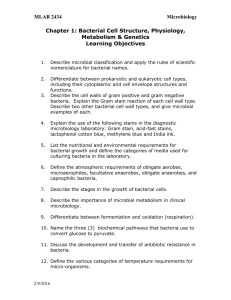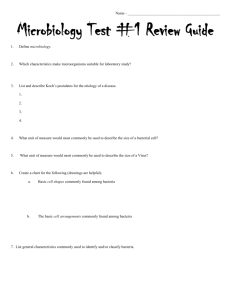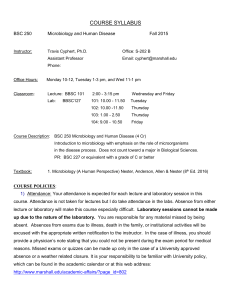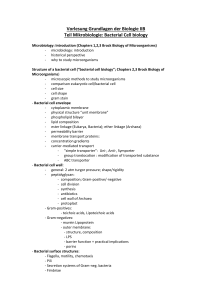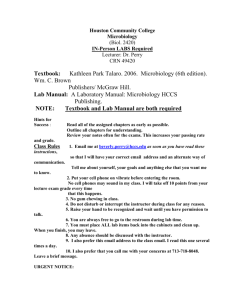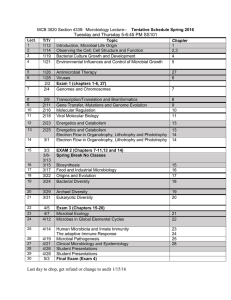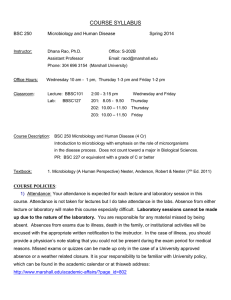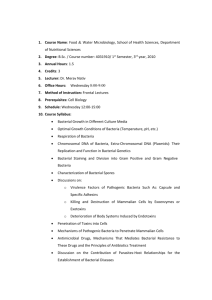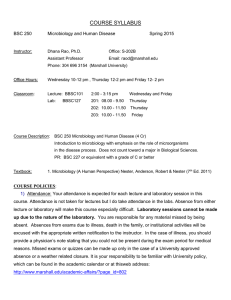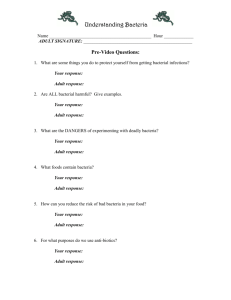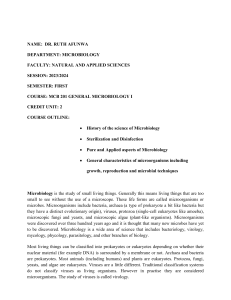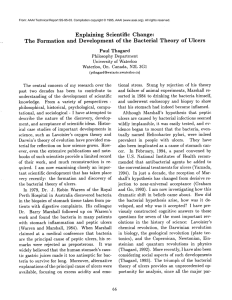BSC 250 - MU BERT - Marshall University
advertisement
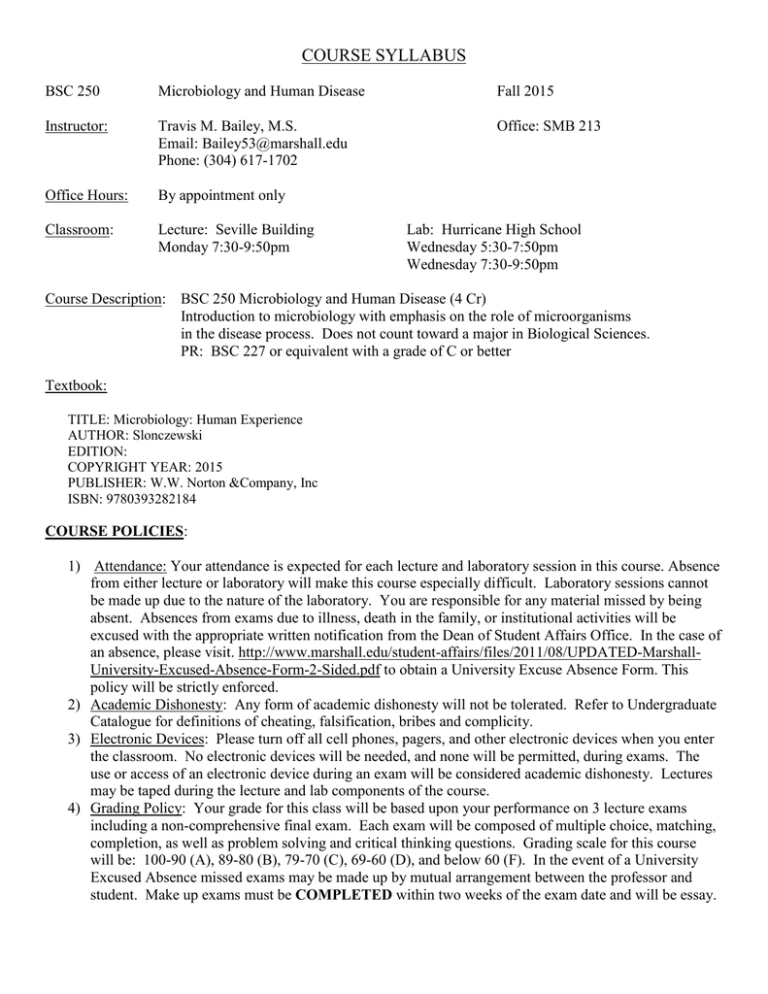
COURSE SYLLABUS BSC 250 Microbiology and Human Disease Fall 2015 Instructor: Travis M. Bailey, M.S. Email: Bailey53@marshall.edu Phone: (304) 617-1702 Office: SMB 213 Office Hours: By appointment only Classroom: Lecture: Seville Building Monday 7:30-9:50pm Lab: Hurricane High School Wednesday 5:30-7:50pm Wednesday 7:30-9:50pm Course Description: BSC 250 Microbiology and Human Disease (4 Cr) Introduction to microbiology with emphasis on the role of microorganisms in the disease process. Does not count toward a major in Biological Sciences. PR: BSC 227 or equivalent with a grade of C or better Textbook: TITLE: Microbiology: Human Experience AUTHOR: Slonczewski EDITION: COPYRIGHT YEAR: 2015 PUBLISHER: W.W. Norton &Company, Inc ISBN: 9780393282184 COURSE POLICIES: 1) Attendance: Your attendance is expected for each lecture and laboratory session in this course. Absence from either lecture or laboratory will make this course especially difficult. Laboratory sessions cannot be made up due to the nature of the laboratory. You are responsible for any material missed by being absent. Absences from exams due to illness, death in the family, or institutional activities will be excused with the appropriate written notification from the Dean of Student Affairs Office. In the case of an absence, please visit. http://www.marshall.edu/student-affairs/files/2011/08/UPDATED-MarshallUniversity-Excused-Absence-Form-2-Sided.pdf to obtain a University Excuse Absence Form. This policy will be strictly enforced. 2) Academic Dishonesty: Any form of academic dishonesty will not be tolerated. Refer to Undergraduate Catalogue for definitions of cheating, falsification, bribes and complicity. 3) Electronic Devices: Please turn off all cell phones, pagers, and other electronic devices when you enter the classroom. No electronic devices will be needed, and none will be permitted, during exams. The use or access of an electronic device during an exam will be considered academic dishonesty. Lectures may be taped during the lecture and lab components of the course. 4) Grading Policy: Your grade for this class will be based upon your performance on 3 lecture exams including a non-comprehensive final exam. Each exam will be composed of multiple choice, matching, completion, as well as problem solving and critical thinking questions. Grading scale for this course will be: 100-90 (A), 89-80 (B), 79-70 (C), 69-60 (D), and below 60 (F). In the event of a University Excused Absence missed exams may be made up by mutual arrangement between the professor and student. Make up exams must be COMPLETED within two weeks of the exam date and will be essay. 5) Laboratory Polices: Safety: Live bacterial cultures are used in this course, since your laboratory desk is shared with other students it is necessary to disinfect your work area each time you come to lab. It is also necessary to wash your hands with any of the various antiseptics provided after finishing the laboratory period. No eating or drinking is permitted in this laboratory. In the event of a spilled culture, notify the instructor immediately so that the contaminated area can be treated with a disinfectant. Attendance: Laboratory attendance is required and it is not possible to make up missed laboratory sessions. More than 3 unexcused absences/late arrivals from lab will result in lowering your grade one letter. Lecture Course Objectives – Students completing this course should: 1) Understand the historical contributions of Pasteur, Koch, Jenner, Erhlich, Flemming and others have made to the field of medicine. 2) Recognize the major groups of microorganisms comprising the microbial world including viruses, bacteria, fungi and protozoans and algae. 3) Understand the anatomy, physiology, growth and genetic exchange mechanisms in bacteria. 4) Understand the host-parasite relationship and the role of microorganisms in the disease process. 5) Understand the basic host defense mechanism in preventing microbial diseases including non-specific and specific immune responses. 6) Understand the immune response in cancer, organ transplantation, autoimmunity and hypersensitivity reactions. 7) Understand the etiology and pathogenesis of selected bacterial, viral and mycotic diseases in man. Laboratory Course Objectives – Students satisfactorily completing this laboratory component of this course should be able to: 1) Use the bright-field microscope to observe bacteria. 2) Be able to prepare a bacterial smear and complete the Gram Stain procedure. 3) Prepare culture media and understand different methods of sterilization. 4) Enumerate bacteria using the viable plate count method. 5) Isolate and characterize Staphylococci from the nasal passage. 6) Determine the sensitivity of bacteria to antibiotics and understand the emergence of resistant bacteria. 7) Identify members of the Enterobacteriace by their biochemical profiles. 8) Estimate and characterize bacteria in selected foods. 9) Complete the microbiological tests used in testing of potable and recreational water. UNIVERSITY POLICY: By enrolling in this course, you agree to the University Policies listed below. Please read the full text of each policy by going to www.marshall.edu/academic-affairs and clicking on “Marshall University Policies.” Or, you can access the policies directly by going to http://www.marshall.edu/academic-affairs/?page_id=802. Academic Dishonesty/Excused Absence Policy for Undergraduates/ Computing Services Acceptable Use/ Inclement Weather/ Dead Week/ Students with Disabilities/ Academic Forgiveness/ Academic Probation and Suspension/ Academic Rights and Responsibilities of Students/ Affirmative action/ Sexual Harassment. DATE 8/24/15 8/26/15 8/31/15 9/2/15 9/7/15 9/9/15 9/14/15 9/16/15 9/21/15 9/23/15 9/28/15 9/30/15 10/5/15 10/7/15 10/12/15 10/14/15 10/19/15 10/21/15 10/26/15 10/28/15 11/2/15 11/4/15 11/9/15 11/11/15 11/16/15 11/18/15 11/23/15 11/25/15 11/30/15 12/2/15 12/7/15 TOPIC History of Microbiology LAB Bacterial Structure LAB HOLIDAY LAB Groups of Microorganisms Bacterial Growth Requirements LAB Microbial Pathogenesis Microbial Metabolism LAB EXAM #1 LAB Innate Immunity LAB Adaptive Immunity LAB Diseases of the Immune System LAB EXAM # 2 LAB Bacterial Residence of the Human Body LAB Medically Important Gram + Medically Important Gram – LAB Emerging Infectious Diseases LAB HOLIDAY NO CLASS Emerging Infectious Diseases LAB FINAL EXAM Grading Summary for Fall 2015 Exam Maximum Points 1 50 2 50 3 50 Lab 50 Total Pts. 200
